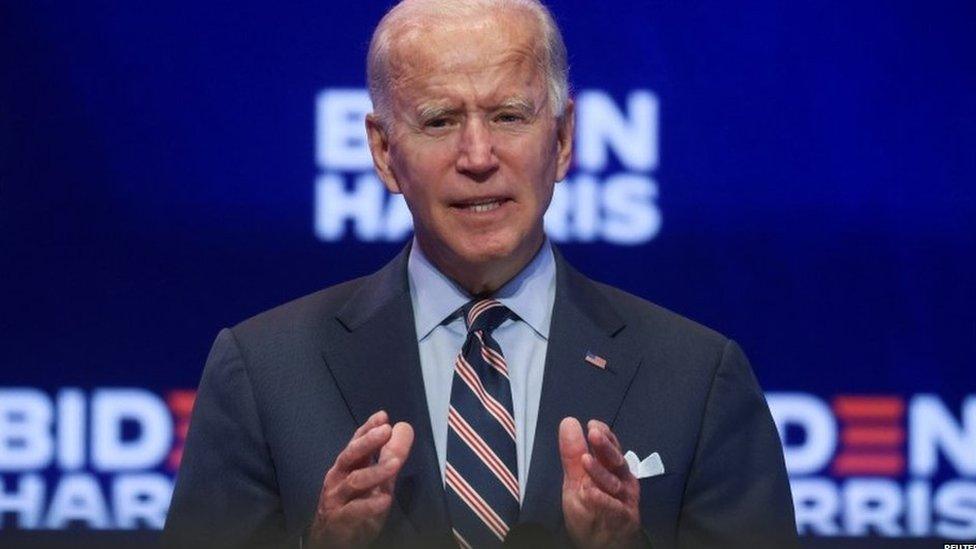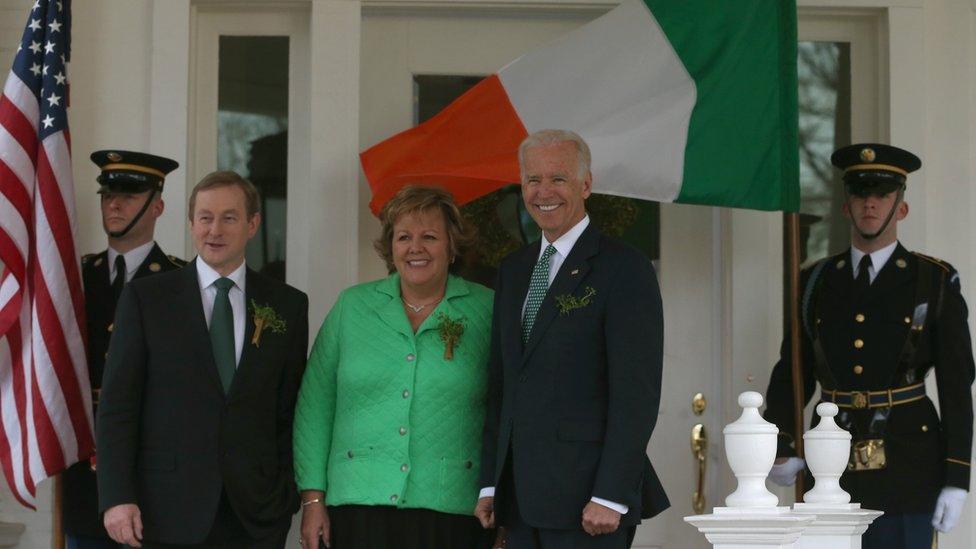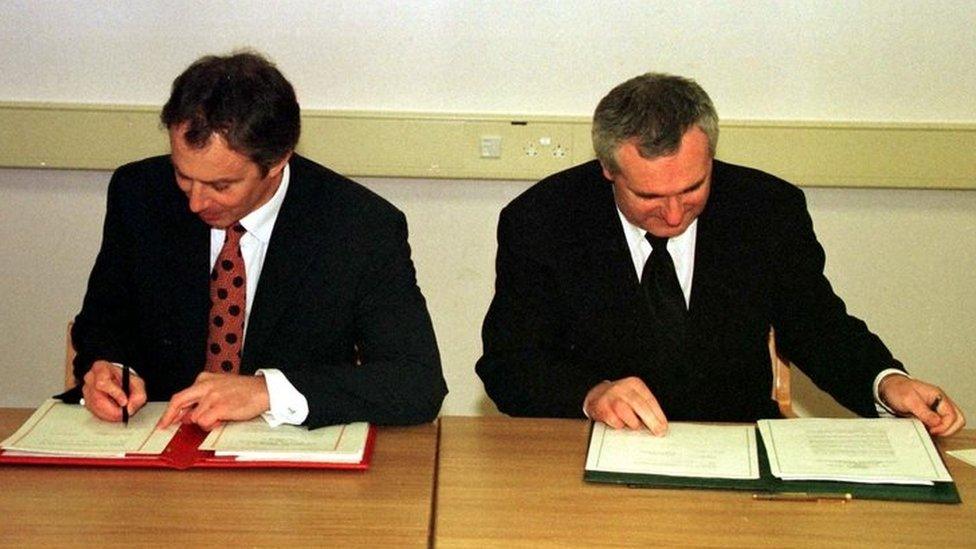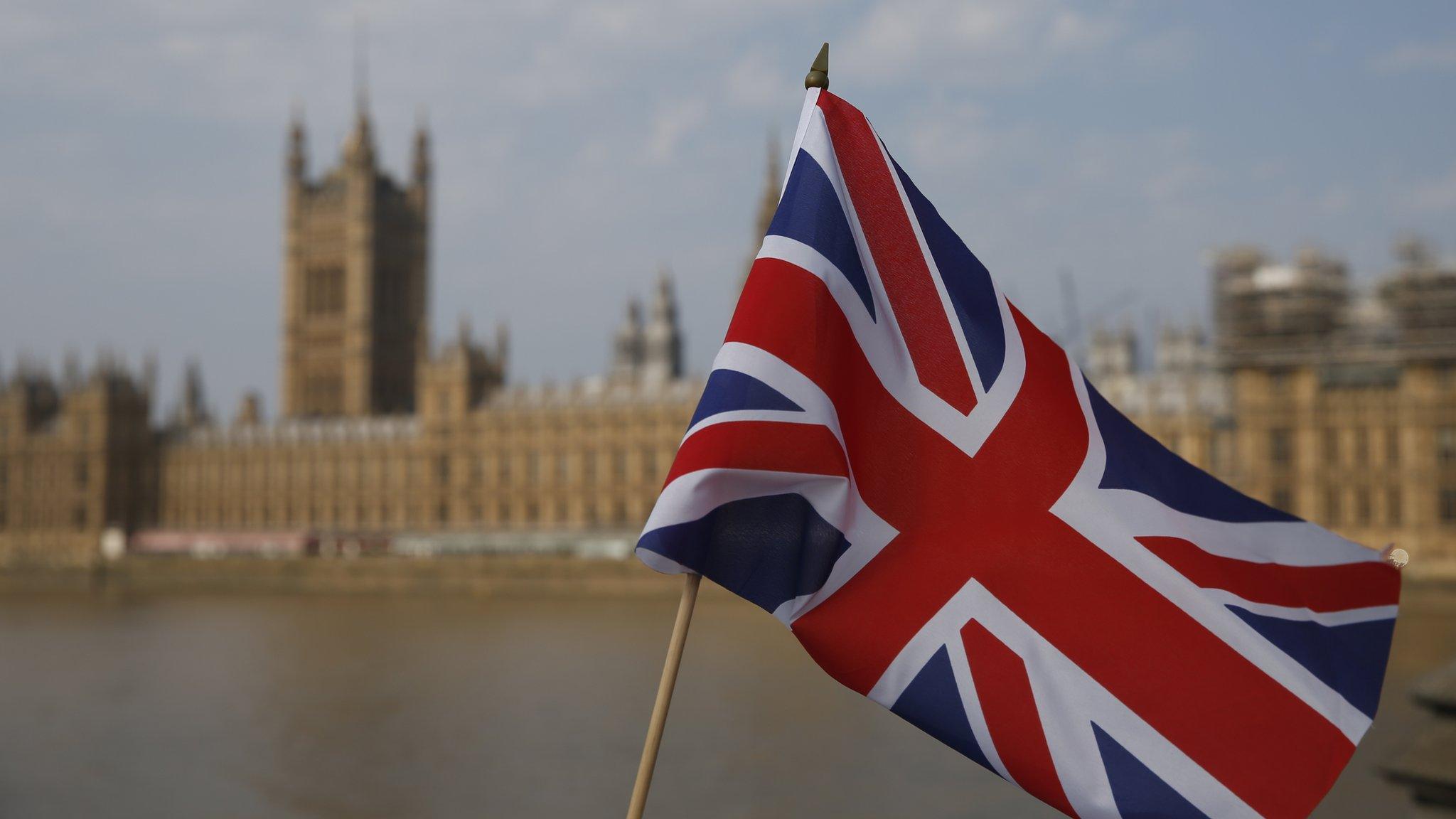Biden says US trade deal hinges on UK 'respect' for Good Friday Agreement
- Published
- comments

Joe Biden has said he will not allow peace in Northern Ireland to become a "casualty of Brexit" if he is elected US President in November.
The Democratic candidate said any UK-US trade deal had to be "contingent" on respect for the Good Friday Agreement.
Foreign Secretary Dominic Raab has been trying to reassure US politicians about the latest Brexit developments during a trip to Washington.
US Secretary of State Mike Pompeo said he trusted the UK to "get this right".
But US Speaker Nancy Pelosi said there was "no chance" of a UK-US trade deal getting through the US Congress if the UK violated international agreements, undermining the Good Friday Agreement.
After a meeting with Mr Raab, the Speaker of the House of Representatives said the UK's exit from the EU could not be allowed to "imperil" peace in Northern Ireland.
She said the lower house of Congress, which is currently controlled by her party, would defend the 1998 Good Friday Agreement as a "beacon of hope for peace-loving people throughout the whole world".
And Mr Biden, who is going up against US President Donald Trump in November's election, tweeted, external.
Allow X content?
This article contains content provided by X. We ask for your permission before anything is loaded, as they may be using cookies and other technologies. You may want to read X’s cookie policy, external and privacy policy, external before accepting. To view this content choose ‘accept and continue’.
Brexit is high on the agenda at the Washington meetings, after the Internal Market Bill cleared its first parliamentary hurdle earlier this week.
The proposed law would give the UK government the power to override part of the Brexit withdrawal deal - which Prime Minister Boris Johnson agreed with the EU last October.
The Good Friday Agreement: A brief guide
It now faces further scrutiny in the House of Commons, and also needs to be passed by the House of Lords.
If the law comes into force, it would breach international law - a prospect that prompted an angry response from senior figures in the US last week.

A proud Irish American

Mr Biden hosts a reception for then Irish PM Enda Kenny and wife Fionnuala in 2014
By BBC Northern Ireland Dublin Correspondent Shane Harrison
Joe Biden is a proud Irish American with roots in counties Louth and Londonderry on his mother's side.
He takes a keen interest in Irish affairs and frequently peppers his speeches with quotes from Irish poets.
When he was Barack Obama's Vice President he hosted successive Irish prime ministers during the St Patrick's day festivities and has been known to holiday and play golf in Ireland with some of the republic's leaders.
So his comments about the Good Friday Agreement should come as no surprise.
Indeed they largely echo concerns expressed by senior Democrat politicians in Congress to British ministers about the impact Brexit may have on the peace process.
The only difference is Joe Biden may soon be elected President of the United States - still the most powerful country in the world.

On Tuesday, four senior congressmen also issued a similar warning, saying a UK-US trade deal would be blocked if the UK failed to preserve the gains of the Good Friday Agreement.
The letter was signed by Democratic congressmen Eliot Engel, Richard Neal, and Bill Keating, who all chair committees in the US House of Representatives, as well as Republican Congressman Peter King.
However, asked about the bill at a joint UK-US press conference Mr Pompeo said: "We trust the UK, we know the complexities of the situation, I have great confidence they will get this right."
Mr Raab said "the threat to the Good Friday Agreement comes from the EU's politicisation of the issue".
He defended the bill as "precautionary and proportionate" adding "what we can't have is the EU seeking to erect a border down the Irish Sea between Northern Ireland and Britain".
Asked earlier about the letter from US politicians, UK Prime Minister Boris Johnson said: "I think when they understand what we are trying to do they will share our ambition and concern which is to protect the peace process."
Sir Jeffrey Donaldson, who leads the Democratic Unionist Party at Westminster, said the "rhetoric coming from Washington is growing increasingly ridiculous".
He said if a post-Brexit trade deal were allowed to lead to new border between Northern Ireland and the rest of the UK, this would "drive a coach and horses" through the Good Friday Agreement, also known as the Belfast Agreement.
"Do unionist voices not matter in [Washington ] DC, or is it just about the Irish-American vote rather than peace in Belfast?," he added.

Is the Good Friday Agreement really under threat?

Tony Blair and Bertie Ahern sign the Good Friday Agreement in 1998
By BBC Northern Ireland political reporter Jayne McCormack
This is not the first time that Brexit and the peace accord's paths have crossed.
During negotiations on the withdrawal agreement, some claimed a hard border between NI and the Republic of Ireland would breach the Good Friday Agreement.
But critics of that argument point out that the text does not contain an explicit commitment, external never to harden the border, and there is nothing about customs posts or regulatory controls.
The only place in which it alludes to infrastructure at the border is in the section on security, which cites "the removal of security installations".
Unionists say the real breach of the deal is the NI Protocol, which instead places an economic border in the Irish Sea.
They claim it breaks the Good Friday Agreement, as it does not have the consent of both communities.
What this latest argument is really about is whether the government's new Brexit plans for Northern Ireland breach the "spirit" of the peace deal.
That in itself is open to interpretation - but is widely understood to be a spirit of non-violence, consent and partnership.
That's what has prompted the intervention from several prominent US politicians, and debate over this is likely to deepen as Brexit talks move towards a conclusion.

In his talks on Wednesday, Mr Raab argued that the government's plans are precautionary and proportionate - and in response to what ministers describe as threats from the EU to block food imports.
Mr Raab also met Mr Pompeo, amid continuing transatlantic tensions over Iran.
The US secretary of state recently accused the UK and its European allies of "siding with the Ayatollahs" for blocking further United Nations sanctions on Iran.
- Published15 September 2020

- Published30 December 2020
